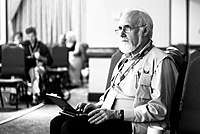John Klensin
John C. Klensin is a political scientist and computer science professional who is active in Internet-related issues.[2][3]
John Klensin | |
|---|---|
 John Klensin, 2007 | |
| Citizenship | US |
| Alma mater | SB 1966, PhD 1979 Massachusetts Institute of Technology |
| Known for | i18n, SMTP, MIME |
| Awards | INCITS Merit Award, Fellow of the ACM, Internet Hall of Fame |
| Scientific career | |
| Fields | Political Science, Computer Science |
| Institutions | MIT, MCI, AT&T |
| Thesis | An evaluation of some geometric methods for automatic exploration of multivariate data.[1] (1979) |
| Doctoral advisor | Aaron Fleisher |
Career
His career includes 30 years as a principal research scientist at MIT, including a period as INFOODS Project Coordinator for the United Nations University, distinguished engineering fellow at MCI WorldCom, and Internet architecture vice president at AT&T; he is now an independent consultant.[2][3]
The Cambridge Project
Klensin was involved in The Cambridge Project,[4] a social science data management cooperation project taking place at MIT, Harvard and other universities from 1969 to 1977. As a part of this program, John Klensin led the development of the Consistent System[5][6][7] targeted for use by Social Scientists. The Consistent System ran on top of the Multics operating system.
Internet
His involvement with Internet protocols began in 1969, when he worked on the File Transfer Protocol.[8]
In 1992, Randy Bush and John Klensin created the Network Startup Resource Center,[9] helping dozens of countries to establish connections with FidoNet, UseNet, and when possible Internet.
IETF
Klensin is the author or co-editor of over 40 RFCs,[10] and has served as IETF Applications Area director 1993-1995,[11] Internet Architecture Board member 1996-2002, and its chair 2000-2002.[12] He again served on the Board from 2009-2011.[13]
The RFCs written or edited by Klensin include SMTP (including RFC 4409 and RFC 5321), IDNA (including RFC 5890 and RFC 6055), Unicode (including RFC 5137 and RFC 5198), and other fields including CRAM-MD5 (RFC 2195) and IETF policies (RFC 3933). In March 2011 8BITMIME (RFC 6152) was published as Internet standard STD 71, in November 2011 Mail submission (RFC 6409) was published as STD 72.
His i18n work also included an April Fools' Day RFC in collaboration with Harald Alvestrand (RFC 5242) and MIME in collaboration with Ned Freed (RFC 4289 among others). As of 2011, he is a member of the RFC Independent Submissions Editorial Board.[14] He is working on several Internet drafts.[15]
Awards and honours
- 2003 - INCITS Merit Award.[16]
- 2007 - inducted as a Fellow of the Association for Computing Machinery.[17]
- 2012 - inducted into the Internet Hall of Fame by the Internet Society.[18]
See also
| Wikimedia Commons has media related to John Klensin. |
References
- Klensin, John C. An evaluation of some geometric methods for automatic exploration of multivariate data. Ph.D. Massachusetts Institute of Technology. Dept. of Political Science.
- "Biography of John Klensin at the ICANN web site". Retrieved 2014-02-10.
- Cade Metz (2012-10-09). "Meet John Klensin, Internet History's Jack of All Trades". Internet Society. Retrieved 2014-02-10.
- "The Cambridge Project: An Interview".
- "The Consistent System at the Multics Glossary".
- "The Cambridge project's consistent system".
- "Cambridge project (Panel Session): The consistent system".
- "Internet Experts selected to fill top organizational posts". ISOC. 1998-04-03. Archived from the original on 2011-08-13. Retrieved 2011-07-23.
- "About the Network Startup Resource Center". nsrc.org. NSRC. 1992. Archived from the original on 2011-08-13. Retrieved 2014-02-10.
- "RFC publication list at networksorcery.com". Retrieved 2014-02-10.
- "List of IESG members at the IETF website". Retrieved 2008-06-17.
- "A brief history of the IAB — Chairs". Retrieved 2011-07-23.
- "List of IAB members from the IAB website". Retrieved 2009-07-10.
- "Independent Submissions Editorial Board". rfc-editor.org. 2011. Retrieved 2014-02-10.
- "John Klensin Data". Document Stats -- What is Going on in the IETF?. Retrieved 2014-02-10.
- "INCITS Awards Honor Roll". INCITS. Archived from the original on 2013-08-01. Retrieved 2011-07-25.
- "List of 2007 ACM Fellows inductees". Archived from the original on 2008-06-19. Retrieved 2008-06-17.
- Internet Society (2012). "2012 Internet Hall of Fame Inductees". Internet Society. Retrieved 2013-07-13.